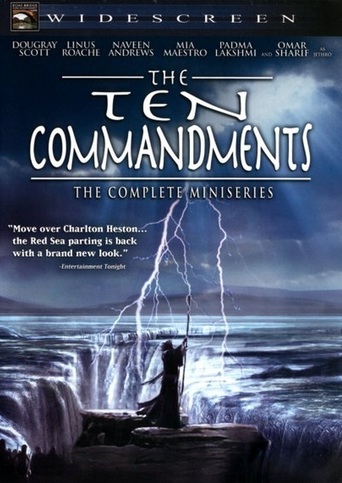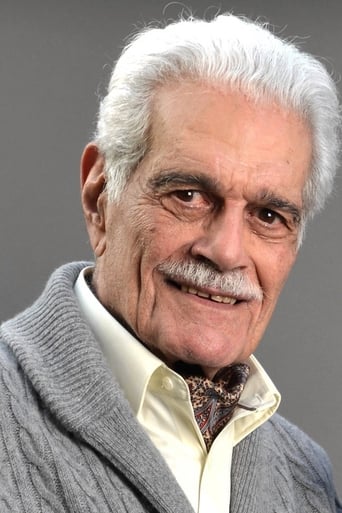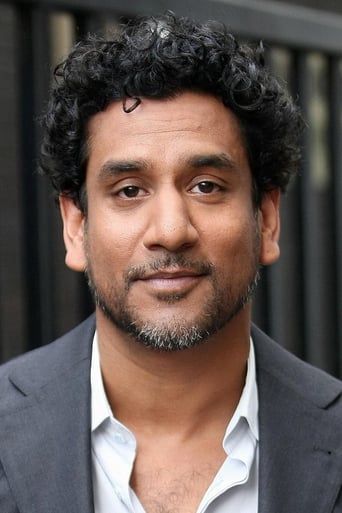

The Ten Commandments (2006)
When an oracle prophesizes that a child will become Prince of Egypt, a time of danger approaches the kingdom. The Egyptian Pharaoh orders the massacre of all newborn males. But one child, Moses-the son of a Hebrew slave-escapes certain death when he is set adrift on the Nile. As years pass, he is raised in a royal Egyptian household and, with no memory of his family, rises to the stature of prince. Upon discovery of his true heritage, and inspired by a fiery message from God, Moses embarks upon a noble and desperate fight to reclaim his destiny as the leader and liberator of the Hebrew people.
Watch Trailer
Cast


Reviews
This movie, "The Ten Commandments" is from a TV mini-series of 2006. The size of scale and use of special effects are pluses, although the CGI was overdone for the bottom of the Red Sea. The film has just half of the 10 plagues, and glances over most of these – the waters turning to blood, frogs, locusts, fiery hail, and death of the first-born. After the Red Sea crossing and destruction of Pharaoh's army, the film has only three more signs of God's power. The first is Moses sweetening poisoned water. The second is his striking a rock to bring forth water, but it eliminates the significant second strike by Moses that was his sign of doubt for which God would deny him entry into the Promised Land. The third is the appearance of manna in strange circles on the ground, with no name for it or explanation beforehand. The film has an account of the Ten Commandments, the making of a golden calf, and the killing of the dissidents' families. It shows the Israelites carrying the body of Joseph out of Egypt to be buried in the Promised Land. It gives a glimpse of the Ark of the Covenant, but doesn't explain what it is. The film leaves out the earthquake that swallows up Dathan and other dissident leaders. It glosses over the Passover, showing only the marking of Israelite homes with lamb's blood on the door posts. And it omits a crucial event and major aspect of the exodus. That was the scouting of the Promised Land for 40 days by young men from the 12 tribes. They returned with fruit of the land, but 10 of the 12 said they could not hope to conquer the land. We can grant license to all films with their imagined accounts of Moses growing up in a royal household in Egypt. The entire story of the birth and childhood of Moses covers a mere 10 verses in the Bible (Ex. 2: 1- 10). Nothing is said of his upbringing except that after his weening, he was brought up by Pharaoh's daughter, Bithiah, as her own son. We learn of the names of his parents, Amram and Jochebed, in Exodus 6:20 and Numbers 26:59. Bithiah's name doesn't appear until First Chronicles 4:17. Pharaoh banished her for having brought an Israelite into the house of Pharaoh, pretending him to be her own. By tradition, Bithiah left with Moses on the exodus. She was part of the "mixed multitude."The next five verses of the Book of Exodus (2:11-16), tell of Moses killing an Egyptian and fleeing to Midian. The last 10 verses of Exodus cover more than 50 years of Moses' life. Moses was 120 years old when he died (Deuteronomy 34:7), which was 40 years after the start of the exodus. He marries Zipporah, eldest daughter of Jethro; their son, Gershom, is born; and Moses shepherds the flocks of his father-in-law. God's calling of Moses from the burning bush takes up the next four chapters of Exodus, 3-6. The next six chapters (7-12) cover Moses and Aaron confronting Pharaoh, the 10 plagues and the institution of the Passover. The flight from Egypt begins with Ex. 12:33. The last 28 chapters of Exodus cover the Ten Commandments, the grumbling and rebellion of the people against Moses and God, the Ark of the Covenant, and the wandering in the desert. After the 10 plagues, God gave more than two dozen signs of his power to the people in their flight from Egypt. Some of this is repeated, more events occur and more details are provided in the next three books of the Bible. At the end of Deuteronomy, the Israelites reach the Promised Land. Moses sees it from atop a mountain, but is not allowed to cross the Jordon River. He dies and is buried there. No one knows the location of his grave. This 2006 TV film is very heavy with dialog and melodrama. Dougray Scott plays Moses as an angry man, believing in God and his power, but lacking connection to the God of his fathers – Abraham, Isaac and Jacob. His character is unlike Moses as he describes himself in the Bible – "not eloquent slow of speech and of tongue" (Ex. 4:10). The film seems heavily weighted on portraying God as vengeful and hard, rather than as impatient and angry because of the unfaithfulness of the people, and their rebellion in the face of all the signs he has given them. It was due to their lack of faith and trust just a few months after leaving Egypt when they scouted the Promised Land, that the people were condemned to wander for 40 years in the desert – until all those over age 20 had died. But this film omits this major event, which is crucial to the Bible lesson. One very curious account is a fictitious couple who commit adultery and are then stoned to death. This distraction is woven throughout the exodus and takes up considerable film time. But, it has no bearing on the exodus, and no grounding in scripture. Another lengthy piece of fiction is the training of the Israelites for combat. By the end, we see warriors with shields, spears, swords and big bows. This version of Moses and the exodus has too much fiction that detracts from the story. Its focus is not on a God who repeatedly forgives the people and then disciplines them for their unfaithfulness, which is the tenor of the Bible accounts. The character of Moses seems quite different from scripture. The film has a scale of the immensity of the exodus and has good special effects, but it skips far too many details and events. It drags on far too long with made-up material.
The Ten Commandments is a TV mini-series that dramatizes the biblical story of Moses,who after following the Prince of Egypt discovers his true identity and sets out on a mission from God.Dougray Scott, Linus Roache, Omar Sharif, and Naveen Andrews headline this epic mini-series from director Robert Dornhelm. An oracle has prophesied that a child will grow up to become the Prince of Egypt, and in order to prevent this from happening The Egyptian Pharaoh orders the immediate slaughter of all newborn males. No child in the entire kingdom is spared except for one. His name was Moses, the son of a Hebrew slave. Set adrift on the Nile immediately after he was born, Moses escapes certain death and enjoys a lavish upbringing in a royal Egyptian household. He has no memory of his past, and soon rises to the rank of prince. After he receives a fiery message from God and learns of his true heritage, he vows to reclaim his destiny by delivering his people from persecution and realizing his fate as the liberator of the Hebrews. The re-telling of this Biblical story unfolds with all of the spectacle, violent human drama, and grand inspiration that have earned it its distinction as the greatest story ever told.Also,the stunning cinematography and eye-catching special effects makes this a highly entertaining mini-series despite the fact that it does not match Cecille DeMille's 1956 The Ten Commandments in terms of extravagance and greatness.
It is difficult to compete against classic greatness, but once you make that choice and the decision is in play, you need find the best and brightest resources to keep your product top drawer, and on the cutting edge of quality. If your intention is to aim for second or third (or fourth) best, why even try? It is with that, I wonder why this version of the Ten Commandments was written, produced, and aired. I would ask the producers, "What were you thinking? Were you endeavoring to create a projected deficit?" If perhaps the producers were thinking, "We want to examine this biblical story from another point of view..." Then I would say "OK, I watched the show, now what's the point of view?" The premise of this "possible point of view theory" eludes me. I can generally watch programs, and (right or wrong) at least get a sense of what the creators were trying to accomplish. Not so, here. I recognize names such as "Robert Halmi" (the producer) and I can associate his work with some eye catching product; Tin Man, Earthsea, Flash Gordon, Jason and the Argonauts. Low budget entertainment based on myth, history and comic book entertainment. A perfect genre for Sci-Fi Channel. So I still have to ask Robert Halmi..."What was the point of THIS Ten Commandments, What WERE you thinking?" FJS
So, I haven't actually seen this movie, but the last person's comment was that Moses is made out to be a whiner, and that later in the movie he has the believers slaughter the unbelievers and cuts a second set of tablets. If that's the case, I really want to see this, because that's far more biblically accurate than the deMille's movie. In the Bible Moses *was* a whiner to begin with, and when the golden calf incident occurred, he had the tribe of Levi kill about 3000 people, and then God told him to cut new tablets to replace the ones he had broken. Just thought I'd say it to clarify that yes, it actually is in there, no matter how unpleasant we may think it.




